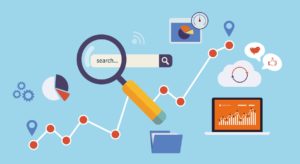From pay-per-click advertising to blogging and search engine optimization for analysis, e-commerce marketing’s broad, diverse, as well as complex nature, basically has the goal to discover what activities, promotions, and tactics are needed to generate profits. The question is, have you have been successful and are you skilled in e-commerce marketing? If not, check this out!
Five years ago, Practical E-commerce published an article describing the skills essential for e-commerce businesses. Suggestions that can be taken more or less: to write, to know how to learn, and to become skilled listeners. This skill is about the strategic capabilities that is required from employers. Skill building is a tactical ability that will help your e-commerce marketing becomes a success.
1. Writing, Content Marketing
 The ability to write is, in essence, the ability to communicate online. Every e-commerce product description, every blog posts, every how-to articles, each of the pages, each video script is the act of writing. Do it well, writing will help encourage the marketing of e-commerce. If not done maximally, it will have an impact as well for your business.
The ability to write is, in essence, the ability to communicate online. Every e-commerce product description, every blog posts, every how-to articles, each of the pages, each video script is the act of writing. Do it well, writing will help encourage the marketing of e-commerce. If not done maximally, it will have an impact as well for your business.
Use something detailed in writing a piece of content marketing, so readers will be able to know clearly what information is contained in an article that you publish. Their role is of course in addition to providing value to the reader, can also draw the reader into a subscriber and would come to the stage as a buyer.
Clear writing is a prerequisite for successful e-commerce marketing.
2. Analysis of Data, Analytics
 Successful marketers examine the facts and statistics to make good decisions about how to invest in marketing and promotion. The ability to consider the facts and understand the implications of statistics is called data analysis. It is important for modern e-commerce marketing.
Successful marketers examine the facts and statistics to make good decisions about how to invest in marketing and promotion. The ability to consider the facts and understand the implications of statistics is called data analysis. It is important for modern e-commerce marketing.
The data analyses have much impact on the field of marketing, including customer acquisition, marketing mix, customer retention, social media, segmentation and promotion strategies;
Marketers who are more effective in using and understanding the data are more likely to succeed.
3. Testing and Data Collection
 Closely related to the data analysis is the ability to gather facts and statistics of your company’s marketing performance.
Closely related to the data analysis is the ability to gather facts and statistics of your company’s marketing performance.
Marketing skills include the ability to set up Google Analytics or similar things, optimize for your e-commerce business with specific, meaningful reports. This includes understanding how the test works and use testing platform like Optimizely or others. It also includes the ability to collect data from each business software packages that you use – such as sales data, email reports, or order management.
In this example, measuring or collecting information about when the respondents are entering is making it easy to see the impact whether email marketing is effective or not. Thus, watch how the practice comes into effect to make better decisions in the future.
If you can collect good information about how your marketing is performing, you are more likely to make good decisions based on such information.
4. Design
 Graphic and website design has severe consequences for marketing. How advertisements, articles, or even a product details page is seen has a significant impact on how the email marketing or even how the product is perceived.
Graphic and website design has severe consequences for marketing. How advertisements, articles, or even a product details page is seen has a significant impact on how the email marketing or even how the product is perceived.
One important element on how to bring shoppers is trust. Brand is essentially a way to influence people’s thoughts: This brand represents quality and luxury, or this brand represents convenience and value.
Regardless of what you aim from the customer is the high price, the brand is very influential for it. If the design is less professional and not in tune with the brand’s core message, it could weaken a good display. Conversely, a good design speaks a lot for a company about its professionalism, quality and position in the market.
To achieve a successful e-commerce business, take a look at how your site, your ad and your brand looks.
5. Development
 The ability to write code can be a big advantage for marketers. This capability may be as basic as understanding HTML and CSS so you can do a better job of posting articles on WordPress. Or perhaps the ability to develop your own marketing tools and reports.
The ability to write code can be a big advantage for marketers. This capability may be as basic as understanding HTML and CSS so you can do a better job of posting articles on WordPress. Or perhaps the ability to develop your own marketing tools and reports.
By some estimates, half of all digital marketing jobs require at least some technical expertise. This happens because so much of what you do online requires at least an understanding of coding.
Learn to code and you will have more control over your marketing. With more control, you have more shots to improve your chances of success.
Related Articles:
- Increase Sales and Build Loyalty with Email Confirmation Order
- 16 Ecommerce Blog You Should Follow16 Ecommerce Blog You Should Follow
6. Advertising
 E-commerce advertisements should be planned, created, purchased, executed, and measured. And it must be done in a lot of channels, using various forms of media, including pay-per-click advertising on search engines and on social media, display advertising, original ads, mobile ads, video ads, and more.
E-commerce advertisements should be planned, created, purchased, executed, and measured. And it must be done in a lot of channels, using various forms of media, including pay-per-click advertising on search engines and on social media, display advertising, original ads, mobile ads, video ads, and more.
Effective e-commerce marketing is to understand how advertising works and trying to get back the best possibilities for investment.
Advertising management is the skill of high-end marketing that may take a long time to learn and even longer to master. But it is worth the effort. Ads can drive sales and profits.
7. Marketing Email
 Citing the Direct Marketing Association, email addresses can determine the development of an online business. Thus, the email may be one of the best ways to reach e-commerce customers. You can communicate directly with consumers who know your business and are interested in your products.
Citing the Direct Marketing Association, email addresses can determine the development of an online business. Thus, the email may be one of the best ways to reach e-commerce customers. You can communicate directly with consumers who know your business and are interested in your products.
In fact, a survey by the Direct Marketing Association digital marketing found that many people believe that email marketing is, in fact, the most effective marketing tool.
Learning to effectively market via email may be the best thing you do for your e-commerce marketing.
8. Marketing Automation
 Marketing automation can reduce marketing costs, improve conversion rates, increase average order value, and, in some cases, even improve the shopper experience.
Marketing automation can reduce marketing costs, improve conversion rates, increase average order value, and, in some cases, even improve the shopper experience.
As skills, marketing automation is about managing the process and workflow automation platforms such as Marketo, Infusionsoft, or even MailChimp.
For your e-commerce marketing, find the right automation tools for your business and master it.
9. Search Engine Optimization
 Search engine optimization is the process of making your web pages easy for web crawlers to access and index. The idea is that if Google, Bing, and other search engines can easily find and catalog what is on your page, the easier it becomes to list your website on the results page accordingly.
Search engine optimization is the process of making your web pages easy for web crawlers to access and index. The idea is that if Google, Bing, and other search engines can easily find and catalog what is on your page, the easier it becomes to list your website on the results page accordingly.
The purpose of SEO is not to trick the search engines with false content or keyword stuffing, but to help the search engines find and understand your content.
If performed well, SEO will help make your site easy to find, which can lead to marketing success.


0 Comments